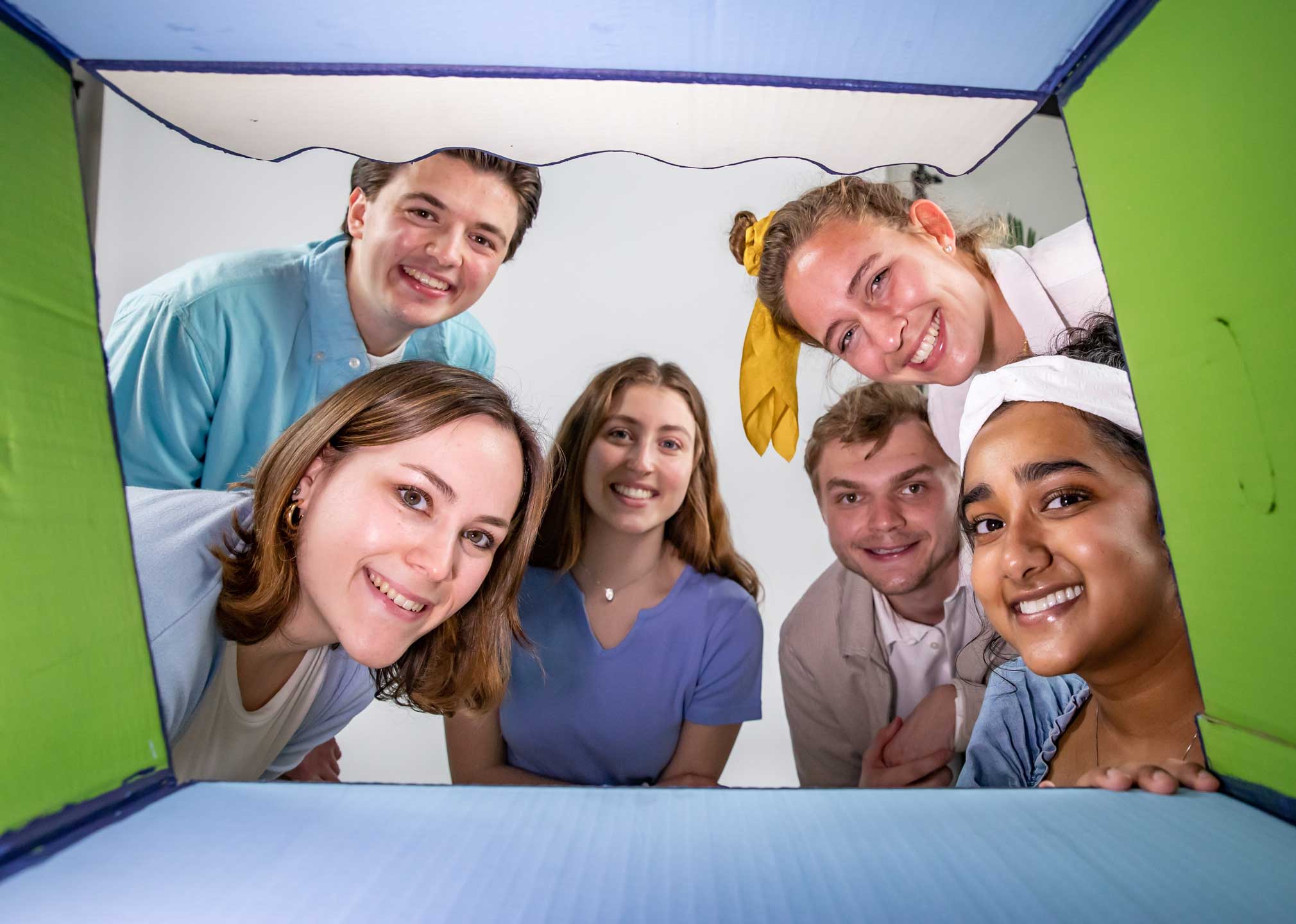Designing extraordinary lives
York College of Pennsylvania formed a dynamic Honors Community from seven separate civically engaged and experiential scholarship and fellowship programs. In this process the college has created something truly distinctive.

At most colleges, the honors program provides perks for high-achieving students: things like dedicated classes, special housing, perhaps a substantial scholarship.
But at York College of Pennsylvania, its new Honors Community provides benefits as well as obligations. Its honors students have opportunities to collaborate with one another, engage with the community, develop an entrepreneurial mindset, and pursue projects and research with real-world impact. With this unique community of scholars and fellows, York College has created a distinctive honors program that supports these students as they construct their individual futures according to their abilities and their interests.
“We wanted to build these programs around a shared vision that students learn better with hands-on learning,” said Dominic DelliCarpini, dean of the Center for Community Engagement, which coordinates the college’s honors programs. “We also want it to drive the learning for all other York College students. Our Honors Community is the leading edge of what the entire college is doing.”
The Honors Community
The Honors Community at York College is a consortium of five engaged scholarships and two fellowship programs brought together within the CCE in December.
The interdisciplinary Honors Community includes more than 100 honors students who represent about 30 different majors. These honors programs attract students with a variety of specific interests, from research and community service to STEM and the arts.
Honors students are enrolled in several classes together, including a project-based first-year seminar that teaches them entrepreneurial thinking and Design Thinking. They work together in a one-credit professional development seminar each semester to develop career skills and assemble a portfolio of their college and community successes. They share a makerspace where they can brainstorm and work on projects. And they can apply for research, travel and other grants to advance their work.
“This is an honors program with a difference,” DelliCarpini said. “We recognized that there are students with special talents and skills that we want to serve well. Our goal is to help them identify their goals and dreams and help them in any way we can.”
It’s not a one-size-fits-all approach. In fact, York College’s Honors Community is distinctive in these five ways:
1. It’s community-based.
Honors colleges typically focus on academics. While York College’s honors students are expected to earn good grades, they’re also required to engage with the community. The Honors Community is centered on project-based experiential learning in and around York, Pa. — the hallmark of the renowned Center for Community Engagement, which is dedicated to improving the quality of life in the York region.
Building these connections starts as soon as honors students arrive on campus. As part of their initial orientation, they meet state and local governmental officials and local business, nonprofit and community leaders they’ll be working with over the next four years.
“We help these students create a network,” DelliCarpini said. “This network gets them what they need while they’re in college and will help them all the way through their lives.”

2. It’s an individuated experience.
The seven programs that comprise the Honors Community are distinct, each with different missions and goals for students. Rather than getting one generic experience, each scholar and fellow moves through their four years at college on a different path.
Moreover, scholars have access to multiple mentors — their academic and major advisor, their program advisor, DelliCarpini and other Honors Community faculty and staff, and community members who form their off-campus network.
“As a small private college, we can really pay attention to each student,” DelliCarpini said. “We do that particularly well in the Honors Community.”
3. It emphasizes global and intercultural learning.
All Honors Community scholars are encouraged to apply to the college for international travel grants. First-year students travel together on a two-week trip each May. In the first two iterations, they have traveled to Greece to work with students at Hellenic Mediterranean University. Through one of the honors programs, the Graham Collaborative Innovation Fellowship program, students also can plan and receive support for more fully funded trips if they develop a set of learning outcomes and a plan for achieving them.
Scholars also advance their intercultural learning at home. Through their community projects, scholars learn to work well together in teams with students and local residents whose backgrounds, values and beliefs might be different from theirs.
“Working in teams is something employers have told us that current graduates need,” DelliCarpini said. “Our scholars also learn interdisciplinary work — how can engineers work with artists? — and how to work across cultures. That’s also crucial in the workplace.”

4. It’s forward looking.
When considering Honors Community applicants, York College does not prioritize high school grades. What the college seeks are talented individuals who are highly motivated to achieve outside the classroom. It looks for creative self-starters and entrepreneurial thinkers. The college wants honors students who are empathetic and eager to work with other ambitious students to find innovative solutions to pressing community problems.
“We don’t just reward their high school work. Instead, the program encourages students to look forward,” DelliCarpini said. “We consistently help them reflect on questions like ‘What are you going to do now? What is your next step?’ We’re motivating students for what they’re going to do in the future.”
5. It’s based in human-centered design.
Honors Community students are steeped in the principles of Design Thinking, a creative problem-solving technique. This five-step process starts with empathy — better understanding and finding the underlying needs of the people you’re seeking to serve. Design Thinking then instructs its users to define an issue, generate ideas, and quickly build and then test prototypes.
Design Thinking principles are at the heart of the Student Academic Innovation Lab, which honors students formed to help York College faculty reimagine teaching and learning for Generation Z. That project birthed Unbound, a student consulting firm that teaches Design Thinking at local schools and nonprofits.
The key to creating these positive working relationships is empathy, which DelliCarpini said has proven to be the skill that most honors students find the most valuable.
“We’re not talking just about service-based empathy, though that’s important,” he said.
“We’re talking about empathy that will help make them better employees because they understand the needs of their coworkers and clients.”


One student’s story
Abby Wurzbach has lived all her life in York County. She grew up on a farm about 30 minutes from York College. As a Graham Collaborative Innovation Fellow, Wurzbach has been able to follow several of her passions — education, business and community service — and travel abroad twice.
After her junior year, Wurzbach traveled to Greece and taught Design Thinking skills to students at a university there. Last fall, she studied abroad in Paris and visited The Netherlands. The Graham program helped cover her travel expenses.

Earlier, Wurzbach put her skills to work with Changemakers, a York College effort to create sustainable change in the city of York. She used Design Thinking techniques and an entrepreneurial mindset to define her new role with the organization. After she was promoted the next year, she used those same skills to coordinate student teams who performed service projects throughout York.
“Empathy interviews and the Design Thinking process are not just used for interviewing or when you’re trying to solve a problem,” said Wurzbach, who graduates in May with a degree in business administration. “They can literally be used in any life experience — whether it’s a class or a relationship or a job where you have to have deeper-level conversations to hear the needs of customers.
“Learning those skills and being a Graham fellow and part of the Honors Community has been invaluable.”
This custom content is sponsored by York College of Pennsylvania and developed by Inside Higher Ed's sponsored content team. The editorial staff of Inside Higher Ed had no role in its creation.


